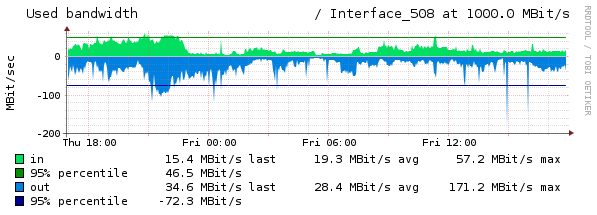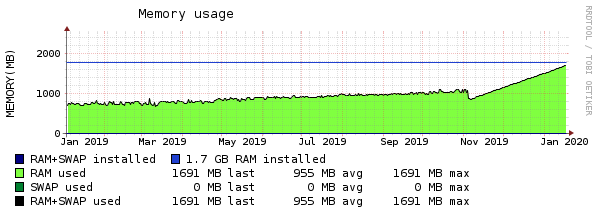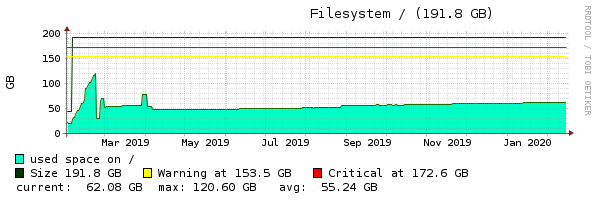|
|
Sponsored Content
Top Forums
UNIX for Advanced & Expert Users
Nearly Random, Uncorrelated Server Load Average Spikes
Post 303044127 by stomp on Friday 14th of February 2020 12:23:07 PM
|
|
10 More Discussions You Might Find Interesting
1. UNIX for Advanced & Expert Users
we have an unix system which has
load average normally about 20.
but while i am running a particular unix batch which performs heavy
operations on filesystem and database average load
reduces to 15.
how can we explain this situation?
while running that batch idle cpu time is about %60-65... (0 Replies)
Discussion started by: gfhgfnhhn
0 Replies
2. UNIX for Dummies Questions & Answers
Hello all, I have a question about load averages.
I've read the man pages for the uptime and w command for two or three different flavors of Unix (Red Hat, Tru64, Solaris). All of them agree that in the output of the 2 aforementioned commands, you are given the load average for the box, but... (3 Replies)
Discussion started by: Heathe_Kyle
3 Replies
3. UNIX for Dummies Questions & Answers
Hello, Here is the output of top command. My understanding here is,
the load average 0.03 in last 1 min, 0.02 is in last 5 min, 0.00 is in last 15 min.
By seeing this load average, When can we say that, the system load averge is too high?
When can we say that, load average is medium/low??... (8 Replies)
Discussion started by: govindts
8 Replies
4. Solaris
Hi,
i have installed solaris 10 on t-5120 sparc enterprise.
I am little surprised to see load average of 2 or around on this OS.
when checked with ps command following process is using highest CPU. looks like it is running for long time and does not want to stop, but I do not know... (5 Replies)
Discussion started by: upengan78
5 Replies
5. UNIX for Dummies Questions & Answers
Hello AlL,..
I want from experts to help me as my load average is increased and i dont know where is the problem !!
this is my top result :
root@a4s # top
top - 11:30:38 up 40 min, 1 user, load average: 3.06, 2.49, 4.66
Mem: 8168788k total, 2889596k used, 5279192k free, 47792k... (3 Replies)
Discussion started by: black-code
3 Replies
6. UNIX for Advanced & Expert Users
Hi ,
I am using 48 CPU sunOS server at my work.
The application has facility to check the current load average before starting a new process to control the load.
Right now it is configured as 48. So it does mean that each CPU can take maximum one proces and no processe is waiting.
... (2 Replies)
Discussion started by: kumaran_5555
2 Replies
7. Solaris
NPROC USERNAME SWAP RSS MEMORY TIME CPU
320 oracle 23G 22G 69% 582:55:11 85%
47 root 148M 101M 0.3% 99:29:40 0.3%
53 rafmsdb 38M 60M 0.2% 0:46:17 0.1%
1 smmsp 1296K 5440K 0.0% 0:00:08 0.0%
7 daemon ... (2 Replies)
Discussion started by: snjksh
2 Replies
8. UNIX for Dummies Questions & Answers
Hi,
I am getting a high load average, around 7, once an hour. It last for about 4 minutes and makes things fairly unusable for this time.
How do I find out what is using this. Looking at top the only thing running at the time is md5sum.
I have looked at the crontab and there is nothing... (10 Replies)
Discussion started by: sm9ai
10 Replies
9. UNIX for Dummies Questions & Answers
how load average is calculated and what exactly is it
difference between cpu% and load average (9 Replies)
Discussion started by: robo
9 Replies
10. Programming
Here we go....
Preface:
..... so in a galaxy far, far, far away from commercial, data sharing corporations.....
For this project, I used the ESP-WROOM-32 as an MQTT (publish / subscribe) client which receives Linux server "load averages" as messages published as MQTT pub/sub messages.... (6 Replies)
Discussion started by: Neo
6 Replies
LEARN ABOUT DEBIAN
anyevent::httpd::request
AnyEvent::HTTPD::Request(3pm) User Contributed Perl Documentation AnyEvent::HTTPD::Request(3pm) NAME
AnyEvent::HTTPD::Request - A web application request handle for AnyEvent::HTTPD DESCRIPTION
This is the request object as generated by AnyEvent::HTTPD and given in the request callbacks. METHODS
url This method returns the URL of the current request as URI object. respond ([$res]) $res can be: o an array reference Then the array reference has these elements: my ($code, $message, $header_hash, $content) = [200, 'ok', { 'Content-Type' => 'text/html' }, '<h1>Test</h1>' }] You can remove most headers added by default (like "Cache-Control", "Expires", and "Content-Length") by setting them to undef, like so: $req->respond([ 200, 'OK', { 'Content-Type' => 'text/html', 'Cache-Control' => 'max-age=3600', 'Expires' => undef, }, 'This data will be cached for one hour.' ]); o a hash reference If it was a hash reference the hash is first searched for the "redirect" key and if that key does not exist for the "content" key. The value for the "redirect" key should contain the URL that you want to redirect the request to. The value for the "content" key should contain an array reference with the first value being the content type and the second the content. Here is an example: $httpd->reg_cb ( '/image/elmex' => sub { my ($httpd, $req) = @_; open IMG, "$ENV{HOME}/media/images/elmex.png" or $req->respond ( [404, 'not found', { 'Content-Type' => 'text/plain' }, 'not found'] ); $req->respond ({ content => ['image/png', do { local $/; <IMG> }] }); } ); How to send large files: For longer responses you can give a callback instead of a string to the response function for the value of the $content. $req->respond ({ content => ['video/x-ms-asf', sub { my ($data_cb) = @_; # start some async retrieve operation, for example use # IO::AIO (with AnyEvent::AIO). Or retrieve chunks of data # to send somehow else. } }); The given callback will receive as first argument either another callback ($data_cb in the above example) or an undefined value, which means that there is no more data required and the transfer has been completed (either by you sending no more data, or by a disconnect of the client). The callback given to "respond" will be called whenever the send queue of the HTTP connection becomes empty (meaning that the data is written out to the kernel). If it is called you have to start delivering the next chunk of data. That doesn't have to be immediately, before the callback returns. This means that you can initiate for instance an IO::AIO request (see also AnyEvent::AIO) and send the data later. That is what the $data_cb callback is for. You have to call it once you got the next chunk of data. Once you sent a chunk of data via $data_cb you can just wait until your callback is called again to deliver the next chunk. If you are done transferring all data call the $data_cb with an empty string or with no argument at all. Please consult the example script "large_response_example" from the "samples/" directory of the AnyEvent::HTTPD distribution for an example of how to use this mechanism. NOTE: You should supply a 'Content-Length' header if you are going to send a larger file. If you don't do that the client will have no chance to know if the transfer was complete. To supply additional header fields the hash argument format will not work. You should use the array argument format for this case. responded Returns true if this request already has been responded to. parm ($key) Returns the first value of the form parameter $key or undef. params Returns list of parameter names. vars Returns a hash of form parameters. The value is either the value of the parameter, and in case there are multiple values present it will contain an array reference of values. method This method returns the method of the current request. content Returns the request content or undef if only parameters for a form were transmitted. headers This method will return a hash reference containing the HTTP headers for this HTTP request. client_host This method returns the host/IP of the HTTP client this request was received from. client_port This method returns the TCP port number of the HTTP client this request was received from. COPYRIGHT &; LICENSE Copyright 2008-2011 Robin Redeker, all rights reserved. This program is free software; you can redistribute it and/or modify it under the same terms as Perl itself. perl v5.14.2 2011-08-04 AnyEvent::HTTPD::Request(3pm)



